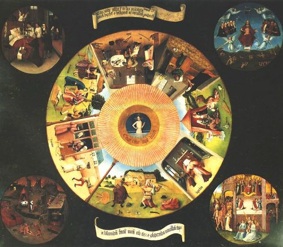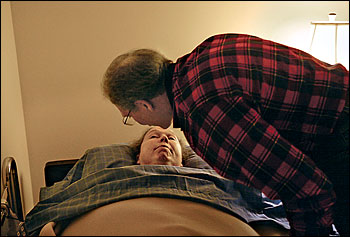
What’s worse for kids: a bad marriage or divorce? The Eliot Spitzer scandal asks that questions all over again, not that I’m implying that they have a bad marriage. It’s just that, well, Silda’s husband hired a hooker. There’s sort of a big problem. Should she bolt or stay?
I always feel uncomfortable commenting on other people’s marriage because I don’t know what intimate exchanges go on between husband and wife. Just as I wouldn’t want anyone to judge mine unfairly. But here’s my two cents on this whole scandal, because, as a blogger, it’s my responsibility to tell you my opinion on everything, right?
I’ve always interpreted the vow “until death due us part” to include both emotional and spiritual deaths, as well as physical ones. Because women trapped in abusive relationships, for example, can kill themselves on many levels by staying in the marriage. I’ve also read reports that say if children see a husband or wife abuse his or her spouse, they are much more likely to tolerate verbal or physical abuse, or be an abuser, in their own marriages.
However, I don’t take divorce lightly. I see how I could have maybe skipped five years of therapy (do the math, at $100 bucks a week), maybe eight, had I not been caught in War World III as a kid.
Author Elizabeth Marquardt argues in her book “Between Two Worlds: The Inner Lives of Children of Divorce” that children of divorce forever feel the wounds of their parents’ split. Collaborating with sociologist Norval Glenn of the University of Texas at Austin in research studies, she arrives that this conclusion: 1. there is no such thing as a good divorce according to grown children of divorce, 2. because of time spent alone, children of divorce ten to have some emotional distance between themselves and their parents, 3. children of divorce grow up between two distinct worlds of parents, who usually differ in values and priorities, causing quite a bit of confusion, and 4. internalizing the conflict of the two worlds, children of divorce say they feel like they had to grow up prematurely, feel the need to act differently around their parents, and keep secrets in order to preserve the peace of the family.
There are opposing views, of course, from authors like University of Virginia psychology professor E. Mavis Hetherington, who asserts in her book “For Better or For Worse: Divorce Reconcidered” that divorce doesn’t necessarily leave children with lasting damage. Hetherington, after studying more than 1,400 families and 2,500 children over the span of three decades, claims that divorce is a part of some “interconnected transitions” that happen in life, rather than a one-time event. Divorce can be positive, she maintains, if it creates new opportunities for personal growth.
If I’ve learned anything in life up to this point, it’s that nothing, absolutely nothing, is black and white, and most situations are infused with so much gray that those who write books telling otherwise are simply unrealistic and insincere. However, I think persons like Silda, who find themselves, in a breach of major trust, do need to take into consideration that just as prostitution and affairs are tragic, so is divorce because it uproots the basic foundation needed for children to thrive.

